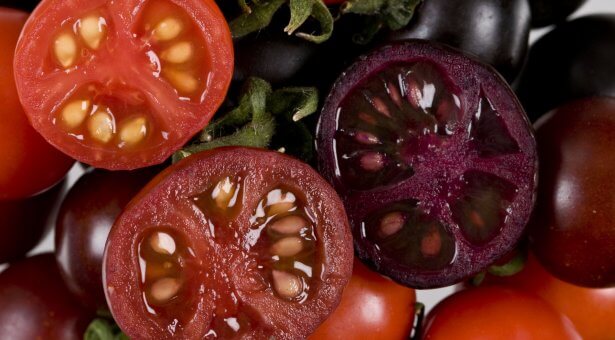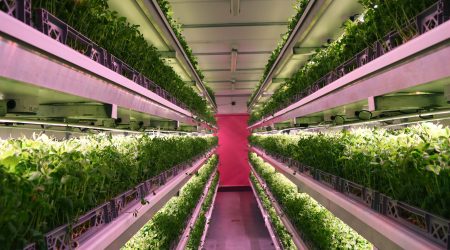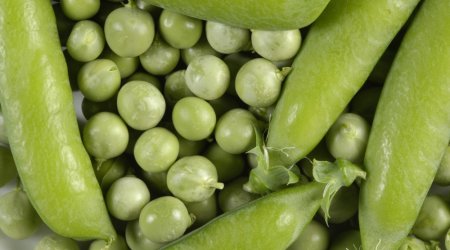Scientists produce beneficial natural compounds in tomato – with potential for industrial scale up

Given the opportunity to drink 50 bottles of wine or eat one tomato, which would you choose?
Scientists at the John Innes Centre have found a way to produce industrial quantities of useful natural compounds efficiently, by growing them in tomatoes.
The compounds are phenylpropanoids like Resveratrol, the compound found in wine which has been reported to extend lifespan in animal studies, and Genistein, the compound found in soybean which has been suggested to play a role in prevention of steroid-hormone related cancers, particularly breast cancer.
As a result of the research led by Dr Yang Zhang and Dr Eugenio Butelli working in Professor Cathie Martin’s lab at the John Innes Centre, one tomato can produce the same quantity of Resveratrol as exists in 50 bottles of red wine. One tomato has also produced the amount of Genistein found in 2.5kg of tofu.
Drs Zhang and Butelli have been studying the effect of a protein called AtMYB12 which is found in Arabidopsis thaliana, a plant found in most UK gardens and used as a model plant in scientific investigation.
The protein AtMYB12 activates a broad set of genes involved in metabolic pathways responsible for producing natural compounds of use to the plant. The protein acts a bit like a tap to increase or reduce the production of natural compounds depending on how much of the protein is present.
What was interesting about the effect of introducing this protein into a tomato plant was how it acted to both increase the capacity of the plant to produce natural compounds (by activating phenylpropanoid production) and to influence the amount of energy and carbon the plant dedicated to producing these natural compounds. In response to the influence of the AtMYB12 protein, tomato plants began to create more phenylpropanoids and flavanoids and to devote more energy to doing this in fruit.
Introducing both AtMYB12 and genes from plants encoding enzymes specific for making Resveratrol in grape and Genistein in legumes, resulted in tomatoes that could produce as much as 80mg of novel compound per gram of dry weight –demonstrating that industrial scale up is possible.
Tomatoes are a high yielding crop – producing up to 500 tonnes per hectare in countries delivering the highest yields (FAOSTAT 2013) and require relatively few inputs.
Production of valuable compounds like Resveratrol or Genistein in tomatoes could be a more economical way of producing them than relying on artificial synthesis in a lab or extracting them in tiny quantities from traditional plant sources (e.g., grapes, soybeans, etc.). The tomatoes can be harvested and juiced and the valuable compounds can be extracted from the juice.
The tomatoes themselves could potentially become the source of increased nutritional or medicinal benefit.
Professor Cathie Martin said:
“Our study provides a general tool for producing valuable phenylpropanoid compounds on an industrial scale in plants, and potentially production of other products derived from aromatic amino acids. Our work will be of interest to different research areas including fundamental research on plants, plant/microbe engineering, medicinal plant natural products, as well as diet and health research.”
Dr Yang Zhang, said:
“Medicinal plants with high value are often difficult to grow and manage, and need very long cultivation times to produce the desired compounds. Our research provides a fantastic platform to quickly produce these valuable medicinal compounds in tomatoes. Target compounds could be purified directly from tomato juice. We believe our design idea could also be applied to other compounds such as terpenoids and alkaloids, which are the major groups of medicinal compounds from plants.”
This research was strategically funded by the BBSRC, the EU ATHENA collaborative project, the Major State Basic Research Development Program (973 Program) of China, the John Innes Foundation, and the DBT-CREST Fellowship.


